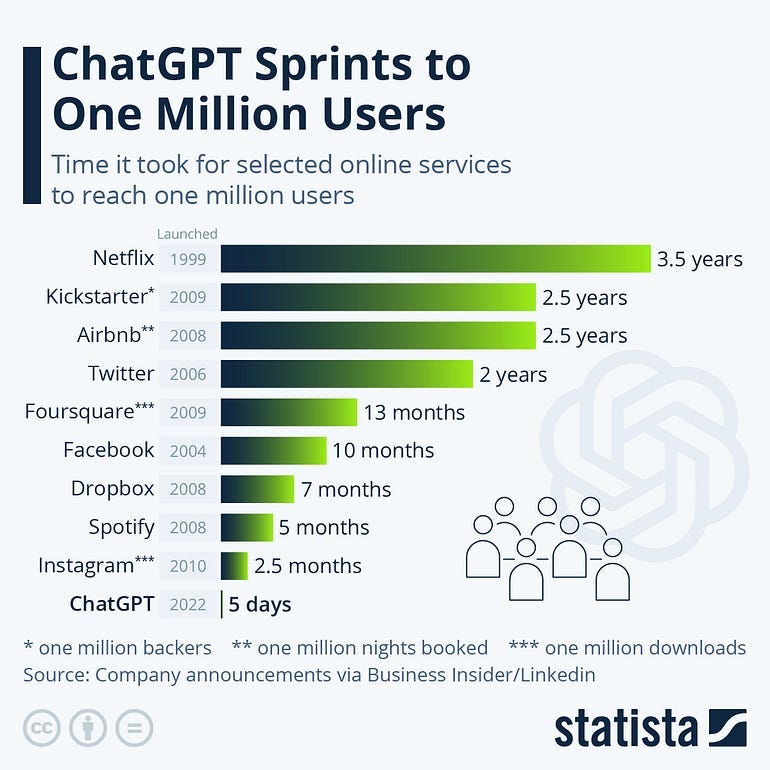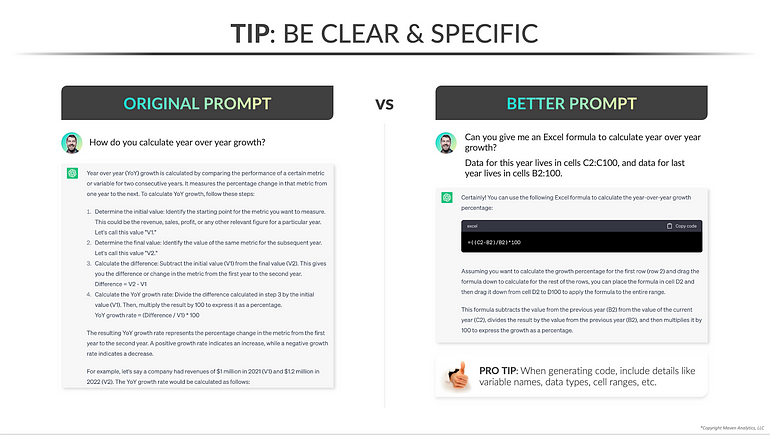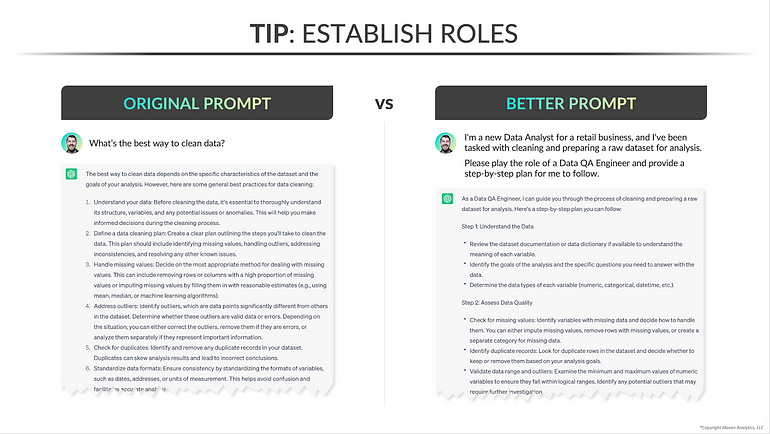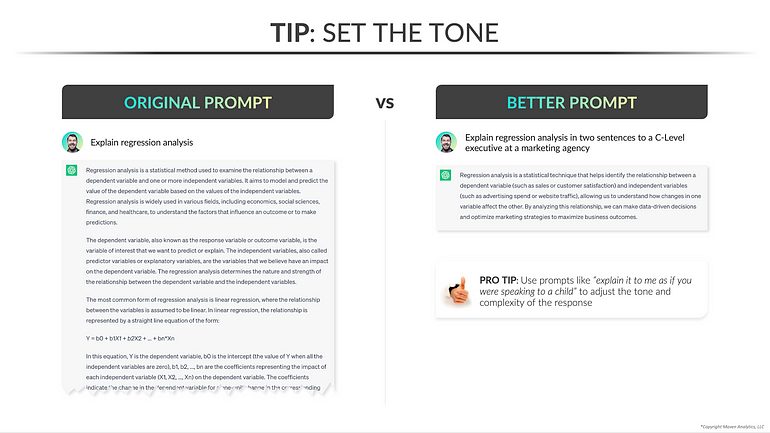
Unleash Data Insights: Mastering AI for Powerful Analysis
Last Updated on July 25, 2023 by Editorial Team
Author(s): Amit Kumar
Originally published on Towards AI.
Discover the Hype Around AI: ChatGPT and Google Bard Unveiled!

By now, you must have come across the exciting talk about AI tools such as ChatGPT and Google Bard.
ChatGPT, in particular, created a global sensation in late 2022, breaking records as it amassed an astonishing one million users within a mere 5 days!

Exploring the Possibilities: How Analytics Professionals Can Utilize Chat-Based Large Language Model (LLM) Tools
You’ve probably heard about the rising popularity of chat-based Large Language Model (LLM) tools like ChatGPT and Google Bard. But you might be wondering how you, as an analytics professional, can actually incorporate them into your work. Today, we’ll delve into exactly that.
Why Data Pros Need To Learn To Use AI Tools
A Rapidly Changing World
In this fast-paced world, we’re witnessing transformative changes.
Revolutionary tools such as ChatGPT and Google Bard have emerged, enabling users to accomplish tasks within minutes that previously consumed hours of their time.
Here are some compelling reasons why data professionals should consider using AI:
- Boost Performance and Efficiency: AI helps enhance your overall performance by streamlining tasks and processes, allowing you to work more efficiently.
- Automate Low-Value Tasks: AI enables you to automate mundane and repetitive tasks, freeing up your time for more valuable activities.
- Focus on High-Value Activities: By delegating routine tasks to AI, you can dedicate your efforts to more important and strategic aspects of your work.
- Verify Work with Ease: AI serves as a convenient tool to double-check your work, ensuring accuracy and reducing errors.
- Quick Learning and Question Resolution: Leveraging AI tools allow you to swiftly learn new concepts and find answers to your inquiries, saving time and effort.
- Stay Competitive and Innovative: Embracing AI keeps you at the forefront of your field, enabling you to remain competitive and up-to-date in a rapidly evolving landscape.
Will AI Tools Render Data Analyst and Data Scientist Jobs Obsolete??
The world of AI has seen remarkable advancements, but does this mean that AI tools will completely replace the need for data analysts and data scientists? Let’s explore this question in simple terms.

The potential impact of AI on the roles of data analysts and data scientists often sparks intense debates, especially among those currently working in or aspiring to join the field. It’s understandable that this concept can be unsettling.
However, concerns about AI replacing analytics professionals are largely exaggerated.
Companies will always require the invaluable qualities that exceptional analysts bring to the table, including:
- Strategic Thinking and Problem-Solving: The ability to think strategically and solve complex problems is a distinct advantage offered by skilled analysts.
- Communication Skills: Effective communication is essential in translating analytical insights into actionable recommendations, which AI alone struggles to do.
- Technical Proficiency: While AI tools can address certain technical aspects, they lack the comprehensive skill set possessed by proficient analysts.
For the foreseeable future, analysts who excel in strategic thinking, problem-solving, and communication skills are unlikely to be replaced by AI in their roles.
However, it’s worth noting that another analyst who effectively utilizes AI tools might outperform their peers.
Consider the analogy of being an analyst without knowledge of spreadsheets or the internet in today’s world — you would be significantly disadvantaged compared to your competitors. The same will soon apply to AI tools.
To maintain a competitive edge in the data field, it’s crucial to nurture your uniquely human skills, establish a strong technical foundation, and embrace cutting-edge technologies like AI. By doing so, you can become unstoppable in your career.
Cautionary Notes: Common Challenges When Using LLM Tools

Before delving into specific analytics use cases for AI, it’s essential to be aware of potential pitfalls that can arise while utilizing these tools. Here are some important points to keep in mind:
1. Protect Sensitive Company Data: Be cautious when sharing sensitive information with LLMs, as it may no longer remain private. Several companies have already prohibited the use of these tools due to data security concerns. Compromising sensitive information externally can lead to serious consequences, including termination.
2. Hallucination and Inaccurate Information: LLMs have a tendency to generate fictitious content, often sounding confident while doing so. It’s crucial to exercise critical thinking and discern between accurate and hallucinated information provided by these tools.
3. Suboptimal Solutions: While LLMs may provide answers to your questions, the solutions offered might not always be the most optimal ones. It’s important to assess the received response critically and consider alternative approaches if needed.
4. Limited Domain Expertise: Current LLM tools possess broad knowledge but may lack specific domain expertise or deep understanding in a particular area where you require their performance.
5. Absence of Common Sense and Human Judgment: LLMs, at least for now, cannot replicate human judgment or possess common sense. These models are trained on vast amounts of information available on the internet, which includes both reliable and unreliable data. Differentiating between them is a challenge for LLMs.
It is crucial to exercise sound judgment and critical thinking when using these tools while being aware of their current limitations. When used appropriately, LLMs can be valuable in accelerating tasks and automating mundane aspects of the analytics workflow.
Furthermore, it’s worth noting that these tools are rapidly improving. Many of the limitations discussed here are being actively addressed, and solutions may emerge in the near future. While considering AI tools, it is important to remember that the landscape is continuously evolving.
Best Practices For Using AI Tools For Analytics
One of the quickest ways to be more effective with these tools is to learn how to write better prompts.
Here are some of our Prompt Engineering tips to help you get the most out of LLMs like ChatGPT and Google Bard:
- Clarity is Key: Enhancing AI Responses through Detailed Information
To optimize the value of AI responses, it is crucial to provide clear and specific details. The more detailed information you provide to the AI, the higher the likelihood of receiving a valuable response. Being specific in your input enables the AI to understand your requirements accurately and generate more relevant insights.

2. Context is Crucial: Enhancing AI Understanding through Detailed Information
When utilizing AI, it is important to provide sufficient context. The more information you can share about your specific situation and the problem you aim to solve, the better. Context empowers the AI to grasp the nuances of your scenario, enabling it to deliver more accurate and tailored insights to address your needs effectively.

3. Setting Roles: Shaping Relevant AI Responses through Clear Instructions
Assigning roles to the AI tool can significantly impact the relevance of its response. Clearly indicating who the AI should impersonate and specifying the intended recipient of the response can greatly influence the generated output. By establishing roles, you can guide the AI in providing more tailored and fitting responses that align with your specific requirements.

4. Establishing the Tone: Guiding AI Responses with Preferences
In order to shape AI responses according to your needs, it is beneficial to set the desired tone. You can prescribe factors such as the level of technicality, level of detail, formality, and length you prefer for the response. By providing these guidelines, you can influence the style and content of the AI-generated response, ensuring it aligns with your specific preferences and requirements.

These are good rules of thumb but don’t overthink them at the expense of speed. It’s easy to scrap your conversation and start fresh if you don’t like where things are headed. So aim for good progress here, and don’t worry about perfection when it comes to prompt writing.
Don’t hesitate to apply these skills to other datasets and continue expanding your data analysis capabilities.
Happy AI!
If you’re interested in connecting with me, you can find me through the following link: Click here to get in touch
Join thousands of data leaders on the AI newsletter. Join over 80,000 subscribers and keep up to date with the latest developments in AI. From research to projects and ideas. If you are building an AI startup, an AI-related product, or a service, we invite you to consider becoming a sponsor.
Published via Towards AI
Take our 90+ lesson From Beginner to Advanced LLM Developer Certification: From choosing a project to deploying a working product this is the most comprehensive and practical LLM course out there!
Towards AI has published Building LLMs for Production—our 470+ page guide to mastering LLMs with practical projects and expert insights!

Discover Your Dream AI Career at Towards AI Jobs
Towards AI has built a jobs board tailored specifically to Machine Learning and Data Science Jobs and Skills. Our software searches for live AI jobs each hour, labels and categorises them and makes them easily searchable. Explore over 40,000 live jobs today with Towards AI Jobs!
Note: Content contains the views of the contributing authors and not Towards AI.














